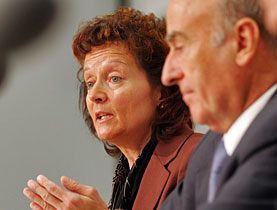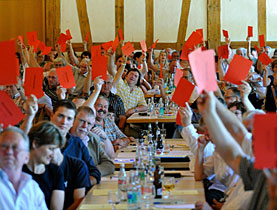Defence Minister Schmid announces resignation

Weakened by controversy and under attack from adversaries, Defence Minister Samuel Schmid on Wednesday announced he would step down at the end of this year.
The announcement had long been expected and followed months of mounting pressure on him to go.
“I am resigning for health and family reasons, and out of love of my country and the army,” an emotional Schmid told a media conference.
The 61-year-old cabinet minister had just returned to work this week after a successful gallstone operation.
In a statement on Wednesday, the cabinet said it had taken note of his decision to step down on December 31, which it regretted.
“The government regrets the resignation of Samuel Schmid, who as a loyal colleague always was and is seeking balanced solutions to problems.”
It thanked him for his “great engagement in the service of the country and its people”.
Pressure
After eight years, Switzerland’s defence minister chalked up some successes including a nationwide vote in favour of an army reform package and the deployment of Swiss armed troops on peace missions abroad.
On Tuesday, Schmid’s SFr917 million ($777 million) army funding package overcame a major hurdle when it passed a vote by the Security Policy Commission.
But Schmid had also been under considerable pressure over the past few months over his handling of army affairs. His appointee as head of the armed forces, Roland Nef, was forced to resign in August after being implicated in a case of sexual harassment.
He has also been criticised over two fatal accidents. In July 2007 six recruits died in an avalanche on the Jungfrau, and in June 2008 five were drowned in a rafting accident.
Despite the pressure, Schmid had resisted calls to step down and at the beginning of November, broke ranks with the rightwing Swiss People’s Party to join the newly formed Conservative Democratic Party.
A moderate within the People’s Party, Schmid served as minister of defence, sport and protection of the population since 2001. He held the rotating post of president in 2005.
Counterweight
Schmid had acted as a counterweight to the dominance of the hardliners within the People’s Party. This was apparent when he was elected to the government on December 6, 2000, as parliamentarians preferred him to the official party candidate, Rita Fuhrer.
This awkward position within his own party meant some difficult moments for Schmid. The most memorable affront was when the People’s Party’s ideologist, Christoph Mörgeli described him as “half a cabinet minister”.
Schmid had to stoically put up with criticism although he did enjoy support from politicians opposed to the People’s Party hardliners. This situation helped the Bernese create an image as a politician who knew how to take punches.
Reserved and slow as a speaker, the Bernese never showed the enthusiastic flamboyance of his predecessor, Adolf Ogi.
He did not interfere in the affairs of fellow cabinet colleagues and was loath to get into polemics. Often portrayed as a man without charisma, he was sometimes described as an “official from the country” who made it to the top.
Affable
But those who know him well speak of someone who is easy to approach and to talk to. He was known for taking the time to stop in the corridors of parliament to say hello to the cleaners.
He was also capable of causing a few surprises. On January 1, 2005 – his first day as president for the year – he paid a visit to a group of border guards in a symbolic gesture that was highly appreciated.
And many remember his “outburst” at the World Summit on the Information Society in Tunis when he publicly criticised censorship practised by the Tunisian government.
Some believed Schmid’s demeanour represented a sign of a lack of ambition and that a more ambitious politician would have probably aimed for the more prestigious and important position as head of the interior, finance or economic ministry.
swissinfo
Born in 1947, Schmid is married and has three children.
After law studies at Bern University, he practised as a lawyer.
He began a political career in his commune of Rüti bei Büren and was later a member of the Bernese cantonal parliament (1982-1993)
He was a member of the Swiss House of Representatives from 1994 to 1999 before becoming a member of the Senate (1999-2000). He was also head of the People’s Party parliamentary group (1998-1999).
Elected to the government on December 6, 2000, he took office the following January. He was president of Switzerland in 2005.
Swiss People’s Party
Schmid’s former party expects Schmid’s place to be taken by a member of the People’s Party.
Party boss Toni Brunner was personally conciliatory towards Schmid, saying he had served the nation well.
Stefan Brubpacher, secretary-general of the Radical Party
Schmid made a difficult decision in difficult circumstances.
“You do not play with the security of the country.”
Swiss Trade Union Federation
Wishes Schmid well in his private life.
Christian Levrat, president of the Social Democratic Party
The resignation was no surprise.
Schmid had been torpedoed by his former party and didn’t want to be the political whipping boy.
Green Party
Schmid was no longer the right man for the job.
His resignation was a wise decision in the face of political controversy and his health concerns.
Eduard Engelberger, president of the SWISS LABEL industry association and Radical Party parliamentarian
Engelberger was surprised but said he understood the defence minister’s decision.
He believes the Swiss People’s Party will be represented in cabinet.

In compliance with the JTI standards
More: SWI swissinfo.ch certified by the Journalism Trust Initiative











You can find an overview of ongoing debates with our journalists here . Please join us!
If you want to start a conversation about a topic raised in this article or want to report factual errors, email us at english@swissinfo.ch.